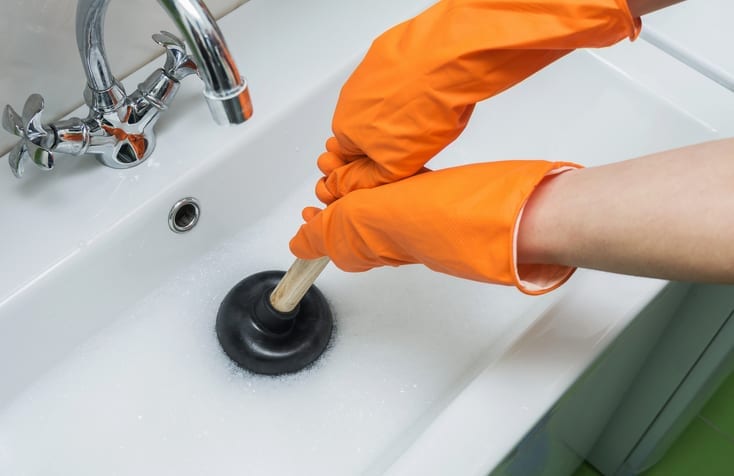Using Plungers and Drain Cleaners: Effective Approaches
Using Plungers and Drain Cleaners: Effective Approaches
Blog Article
Each person has got their own unique idea with regards to How To Use Your Toilet Plunger Correctly in 5 Easy Steps.

Introduction
Appropriate upkeep of home drains pipes is essential for stopping obstructions and guaranteeing smooth water circulation. Among the key tools in every house owner's toolkit is the bettor, along with various drain cleaners developed to deal with persistent obstructions properly. This article explores how to make use of plungers and drain cleaners successfully to maintain your drains flowing easily.
Section 1: Recognizing Bettors
Sorts of Plungers
There are several types of plungers available, each developed for different types of drains and clogs. The most typical kinds include cup bettors, flange plungers, and accordion bettors.
Exactly How Plungers Job
Bettors work with the principle of producing stress and suction to dislodge blockages. When effectively applied over a drainpipe, they develop a vacuum that can pull out particles or break up clogs.
Picking the Right Bettor
Choosing the best plunger relies on the kind of drain and the nature of the obstruction. Mug plungers are excellent for sinks and bathtubs, while flange plungers are better matched for commodes as a result of their layout.
Usual Blunders with Bettors
Preventing these blunders makes certain reliable plunging: incorrect seal around the drainpipe, not enough force, and not clearing bordering debris.
Area 2: Using Plungers Effectively
Prep work
Before plunging, make certain the plunger covers the drainpipe totally and forms a limited seal. Clear any kind of visible particles around the drain opening.
Method
Beginning with gentle plunging activities to build suction. Boost stress gradually, utilizing a constant rhythm. Repeat as necessary until the drain removes.
Repairing Tips
If plunging does not work, try changing the seal, using oil jelly for a better seal, or using a various kind of plunger.
Area 3: Understanding Drainpipe Cleaning Company
Kinds Of Drainpipe Cleaners
Drain cleansers can be chemical or chemical. Chemical cleaners utilize solid chemicals to liquify obstructions, while enzymatic cleaners utilize all-natural enzymes to break down raw material.
How Drain Cleaners Work
Chemical cleaners react with blockages to liquify them, while chemical cleaners break down natural materials like hair and oil without hurting pipes.
Safety and security Factors to consider
Constantly put on gloves and eye protection when making use of chemical drain cleansers. Make certain ample air flow and adhere to supplier guidelines thoroughly.
Eco-Friendly Alternatives
Think about making use of vinegar and baking soft drink or enzyme-based cleaners for environmentally friendly alternatives that are much safer for pipelines and the environment.
Section 4: Making Use Of Drain Cleansers Properly
Application Techniques
Pour chemical cleansers straight into the drain opening. Permit them to work for the advised time prior to flushing with hot water. Chemical cleansers should sit over night.
Precautions
Prevent blending various types of cleaners, as this can create poisonous fumes. Never utilize chemical cleaners combined with a bettor, as spilling can take place.
Taking Care Of Persistent Obstructions
For relentless blockages, think about utilizing a plumbing snake or calling a specialist plumbing professional to stop damages to pipes.
Conclusion
Finally, recognizing exactly how to use bettors and drain cleaners properly is important for keeping healthy and balanced plumbing systems. By picking the right tools and strategies, property owners can tackle minor obstructions and avoid major pipes issues down the line.
How To Properly Use A Plumbing Snake To Clear Drains
When any drain clogs in our home arise, we tend to gravitate toward the plunger and little else. In cases where the plunger and its vacuum-created pressure are not able to clear clogs, many immediately move to harmful chemicals or simply call their plumber to fix the issue.
we’re happy to help with all drain cleaning needs and concerns. This includes informing you on a few other home remedies you may have at your disposal for minor to moderate clogs, one of which is the use of a plumbing snake. Many people have never used one of these before – let’s go over the steps to take when your drain clogs and you have a plumbing snake available.
Attempt Plunger Use
The first step here, as we noted above, should indeed be to grab your plunger when you notice a drain clog and attempt to resolve it this way. If you’re unsure how to use a particular type of plunger, our plumbers can answer any questions you have. If this doesn’t do the trick, however, you move on to the snake.
Locate And Prepare Snake
A plumbing snake is a metal or plastic device that’s generally about a quarter of an inch thick. It’s design with significant extensions, meant to reach down into your clogged drain and push the clog out. Snakes also contain drain augers that will latch onto and push stubborn blockages.
If your plunger doesn’t clear a clog, locate your snake and bring it to the drain in question. We also recommend keeping a bucket nearby to collect the clog once you pull it out, plus we’d advise wearing goggles and possibly protective gloves.
Feed Snake
Once you’re ready to go, feed the snake slowly down the drain, using the crank device it comes with to keep it moving until it finds the clog. Once this happens, much of the clog will be latched onto the coil so you can pull it out, while the rest will simply break up and flow downward.
Detach Debris
Remove the snake slowly from the drain, and once you’ve done so, pick off any debris that’s stuck to the coil. This is another area where wearing gloves is a must.
Flush Drain
Finally, take a few minutes to ensure the snake has done its job correctly. If you’ve been using it on a toilet, flush the toilet a couple times and make sure everything flows well. If you’ve used it on a different drain, flush it with some room temperature water.
https://www.mybuddytheplumber.com/blog/how-to-properly-use-a-plumbing-snake-to-clear-drains/

Application Techniques
Pour chemical cleansers straight into the drain opening. Permit them to work for the advised time prior to flushing with hot water. Chemical cleansers should sit over night.
Precautions
Prevent blending various types of cleaners, as this can create poisonous fumes. Never utilize chemical cleaners combined with a bettor, as spilling can take place.
Taking Care Of Persistent Obstructions
For relentless blockages, think about utilizing a plumbing snake or calling a specialist plumbing professional to stop damages to pipes.
Conclusion
Finally, recognizing exactly how to use bettors and drain cleaners properly is important for keeping healthy and balanced plumbing systems. By picking the right tools and strategies, property owners can tackle minor obstructions and avoid major pipes issues down the line.
How To Properly Use A Plumbing Snake To Clear Drains
When any drain clogs in our home arise, we tend to gravitate toward the plunger and little else. In cases where the plunger and its vacuum-created pressure are not able to clear clogs, many immediately move to harmful chemicals or simply call their plumber to fix the issue.
we’re happy to help with all drain cleaning needs and concerns. This includes informing you on a few other home remedies you may have at your disposal for minor to moderate clogs, one of which is the use of a plumbing snake. Many people have never used one of these before – let’s go over the steps to take when your drain clogs and you have a plumbing snake available.
Attempt Plunger Use
The first step here, as we noted above, should indeed be to grab your plunger when you notice a drain clog and attempt to resolve it this way. If you’re unsure how to use a particular type of plunger, our plumbers can answer any questions you have. If this doesn’t do the trick, however, you move on to the snake.
Locate And Prepare Snake
A plumbing snake is a metal or plastic device that’s generally about a quarter of an inch thick. It’s design with significant extensions, meant to reach down into your clogged drain and push the clog out. Snakes also contain drain augers that will latch onto and push stubborn blockages.
If your plunger doesn’t clear a clog, locate your snake and bring it to the drain in question. We also recommend keeping a bucket nearby to collect the clog once you pull it out, plus we’d advise wearing goggles and possibly protective gloves.
Feed Snake
Once you’re ready to go, feed the snake slowly down the drain, using the crank device it comes with to keep it moving until it finds the clog. Once this happens, much of the clog will be latched onto the coil so you can pull it out, while the rest will simply break up and flow downward.
Detach Debris
Remove the snake slowly from the drain, and once you’ve done so, pick off any debris that’s stuck to the coil. This is another area where wearing gloves is a must.
Flush Drain
Finally, take a few minutes to ensure the snake has done its job correctly. If you’ve been using it on a toilet, flush the toilet a couple times and make sure everything flows well. If you’ve used it on a different drain, flush it with some room temperature water.
https://www.mybuddytheplumber.com/blog/how-to-properly-use-a-plumbing-snake-to-clear-drains/

We had been introduced to that report about How to Use a Plunger to Unclog a Toilet or Drain through a buddy on another web address. Sharing is caring. Helping people is fun. Thanks a lot for being here. Kindly visit our website back soon.
This Page Report this page